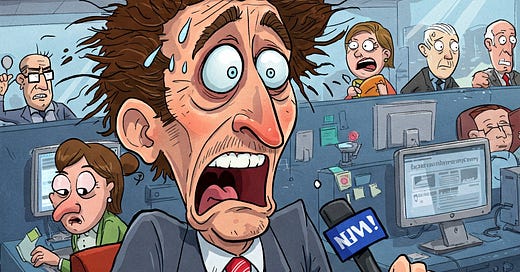The Dangers of Crying Wolf: A Lesson in Political Messaging
The media have lost the publics attention as their "sky is falling" rhetoric now falls on deaf ears.
"The Sky is Falling!" and "Wolf! Wolf! Wolf!" – two important lines from two cautionary tales, Chicken Little and the Boy Who Cried Wolf. We used to remind our youth that repeatedly warning of dire consequences eventually rings hollow. The American left and mainstream media are now learning this important lesson.
When Trump was first elected, the media and many in the public warned that democracy "was over" and that Trump was a demagogue who would wreak havoc on various special interest groups. Back then, the public bought much of it. This time around, however, things are noticeably different.
Trump's team has implemented many changes, from developing DOGE to appointing Pete Hegseth and Kash Patel. These are significant moves, yet the public has generally been unperturbed. While politics will always involve some hand-wringing, the general public seems largely uninterested in these developments. They appear less worried about Trump than during the last election because they've become desensitized to the rhetoric. They've heard "Wolf!" so many times that they're no longer inclined to respond.
Much of this was predictable. At Trump's November appearance at Madison Square Garden, over 18,000 people (mostly New Yorkers) came to support him, while only a handful of protesters showed up. Conventional wisdom would have predicted pandemonium on the streets outside MSG, with thousands of protesters clashing with Trump supporters. Instead, nothing happened. The writing was already on the wall.
This lesson extends far beyond partisan politics. It speaks to a fundamental principle of human psychology and social communication: the importance of maintaining credibility through measured, proportional responses. When leaders or institutions consistently escalate their rhetoric to the highest possible level for every issue, they risk depleting their reservoir of public trust and attention.
Similar issues have emerged with climate activism. When I was in third grade, my teacher claimed California would be underwater by 2024 and there would be no fish left on Earth by 2040. Years later, my fourth-grade daughter's class encountered a substitute teacher who repeatedly berated the students for "destroying the planet." My daughter said the class just laughed at the teacher – quite different from my time, when we were genuinely worried about such threats. Whether it's Greta Thunberg warning about ice melt or Jake Tapper warning about Hitler 2.0 returning to the White House, the public isn't buying these arguments en masse. While activists remain, they've lost the public's trust.
The left, the media, and social activists are learning an important lesson: Don't exaggerate. Don't lie. Deception and hyperbole have their limits, and eventually, the truth catches up. The media made it their mission to ensure Trump would never be elected again after his first term, and they've failed. They failed because they went to the well too many times, and public outrage has run dry.



